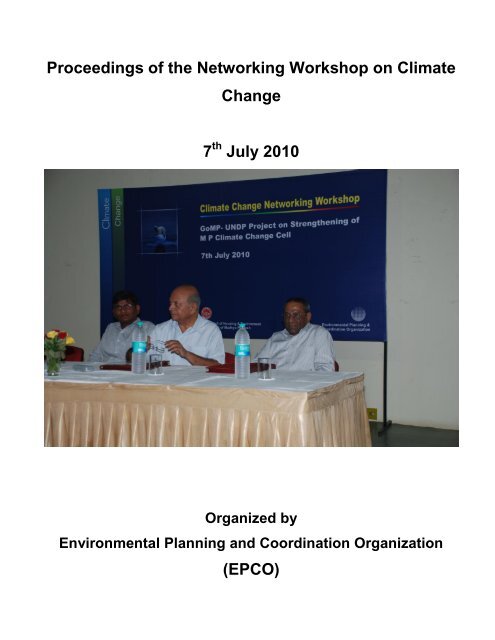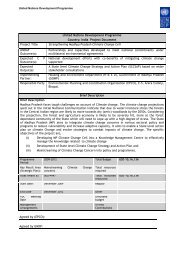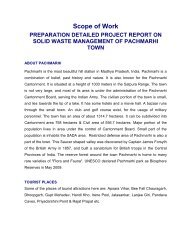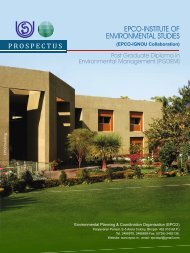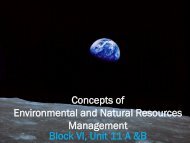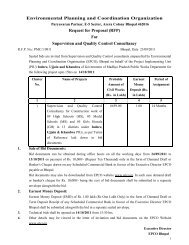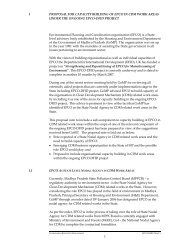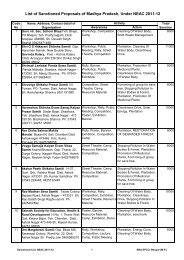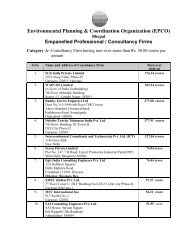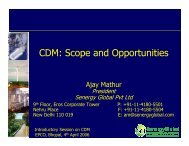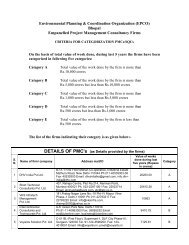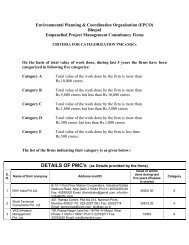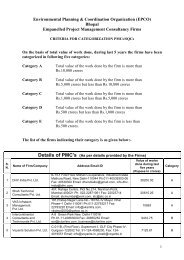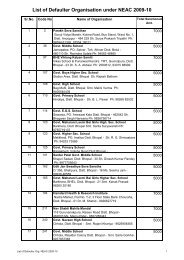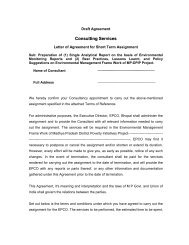Networking Workshop - EPCO
Networking Workshop - EPCO
Networking Workshop - EPCO
Create successful ePaper yourself
Turn your PDF publications into a flip-book with our unique Google optimized e-Paper software.
Proceedings of the <strong>Networking</strong> <strong>Workshop</strong> on ClimateChange7 th July 2010Organized byEnvironmental Planning and Coordination Organization(<strong>EPCO</strong>)
Executive SummaryAs part of GoMP-UNDP project <strong>EPCO</strong> is preparing State Action Plan on Climate Change and a KnowledgeManagement Centre is proposed to be setup at <strong>EPCO</strong>. One of the functions of this knowledgemanagement centre is to establish a vibrant network with institutions currently working in the field ofClimate Change and on allied issues. The workshop was organized to have networking with variousinstitutes working in the area of Climate Change in the state.About 47 institutes from all over the state were invited to participate in the workshop, of which 31institutions participated in the workshop. Presentations were made on the topics related to ClimateChange on which various institutions have undertaken research and more areas of research wereidentifiedWe wish to continue this partnership further and work together to fight Climate Change in a collectiveway.Environmental Planning and Coordination Organization...................................................................... 1
List of ParticipantsS.no Name & Designation Department Ph.No Email1 Dr. Avinash Jain TFRI Jabalpur 9826563036 jainavi@yahoo.com2 Dr. Ramya Sunder IISER, Bhopal 0755-4092318 ramyasr@iiserbhopal.ac.inRaman3 Ravi Shrivastav MFP Federation 2674244 raveesri@rediffmail.com4 Priyanka Dubey MPJAP mpjap@rediffmail.com5 Archana Soni Energy Centre, MANIT 9993943780 archanasoni_manit@rediffmil.com6 Saroj Rangnekar Energy Centre, MANIT 9425693993 rangnekars@manit.ac.in7 Satish Awale Energy Centre, MANIT 9406928405 ready.satish@gmail.com8 Dilip Kumar Singh DMI 9425377504 dilipksingh@rediffmail.com10 Manmohan Kapshe SPA, Bhopal 989306469611 H S Malviya MPPCB 942501729812 Gyan Chand RMRCT,Jabalpur 989907571213 A C Karera MPPCB 999302724314 Dr. P V Borde RMRCT, Jabalpur 942425824015 Prof. R K Trivedi Sagar University 9425613688 rkt_sagar@hotmail.com16 Prof.L. P. Chourasia Sagar University 9425451759 lpc55@rediffmail.com17 Varghese Paul TCPSU, MPRLP 9893043691 vpaul@tcpsu.org18 Dr. D P Dubey, IMD 9425024342Director19 Dr. Rakesh Sharan MPCST 982149805720 Dr. Sandeep Goyal MPCST 2671486 sgoyalbsg@gmail.com21 Dr. Bhaskar Sinha IIFM 946534297 bsinh@iifm.ac.in22 Anita Thakur ZARS(AAS) 9827203578 anita_11oct@yahoo.co.in23 Dr. S C Dubey HSADL,IVRI 9425606992 scd_11@yahoo.co.in24 Dr. Anamika Mishra HSADL,IVRI 9229131508 reach2anamika@yahoo.com25 Dr. Elizabeth Thomas MPSBB 999363314726 Dr. R B Lal, Director IIFM27 Dr. V R Khare <strong>EPCO</strong>28 Sanjay Sharma DFID 808581416829 Dr. U K Subuddhi EDB 942479005230 Dr. M Verma IIFM 930080347931 Dr. H S Gupta IIFM 9826842926Environmental Planning and Coordination Organization...................................................................... 2
32 Dr. U K Sarma IIFM 986817960433 Dr. Arvind Bijalwan IIFM 941298380834 Girish Joshi MPJAP 942506233235 Bala MPJAP 942530105936 V K Sharma Higher Education 942582445937 Dr. K S Sharma MVM Bhopal 942518471738 Dy. Director State Museum39 DhirendraMPJAP 9425667551Chaturvedi,ED40 Prof. Ashwani Barkatullah Univ 9425301479Wangneo41 Dr. K B Hebbar IISS, Bhopal 998159701042 Dr. S K Pathak WALMI, Bhopal 408250643 S S Kushwar Agricilture College, 9425366536Sehore44 Pushpendra Pal Singh Makhanlal University 942554349945 Dr. L K Malthu CGWB 903944103046 S K Bhatnagar CGWB 958959142247 Dr. Ramadhar Singh CIAE 968563630948 Dr. P L Singh CIAE 989384070449 K C Tiwari IGNOU 942501827050 Dr. K K Agrawal JNKVV,Jabalpur 942516338551 Dr. S D Upadhyay JNKVV,Jabalpur 942536054652 Dr. O P Chaubey SFRI, Jabalpur 997741116453 Mayank M Verma SFRI, Jabalpur 998165710054 Dr. S Dixit SFRI, Jabalpur 9826319273Environmental Planning and Coordination Organization...................................................................... 3
<strong>Workshop</strong> Schedule09.30 - 10.00 Registration10.00 – 10.30 INAUGURAL SESSION Welcome Note by Shri V R Khare, Advisor Climate Change <strong>EPCO</strong> Address by Shri Ashok Shah, Executive Director <strong>EPCO</strong> <strong>Workshop</strong> purpose and structure Vote of Thanks10.30-11.00 Tea11.00 – 14.00 Introduction of Climate Change Cell, <strong>EPCO</strong> and GoMP –UNDPproject- By CC Cell, <strong>EPCO</strong> Process and Framework of SAPCC by CC Cell, <strong>EPCO</strong> Presentations from Participating Institutions- Identification of Area of cooperation14.00 - 14.30 <strong>Networking</strong> LunchEnvironmental Planning and Coordination Organization...................................................................... 4
Brief Summary of the PresentationsShri. V.R.Khare, Advisor, Climate Change Cell, <strong>EPCO</strong>Shri Khare welcomed the participants of all the networking institutions and thanked them for attendingthe workshop. He commented that this is not a simple meeting but a “Meeting of Minds”, whoseobjective is to tackle Climate Change. He briefed all about the National Action Plan on Climate Changeand told about the eight sub missions namely, National Solar Mission, National Mission for EnhancedEnergy Efficiency, National Mission on ‘Sustainable Habitat’, National Water Mission, National Missionfor Sustaining the Himalayan Ecosystem, National Mission for a Green India, National Mission forSustainable Agriculture and National Mission on Strategic Knowledge for Climate Change.He called upon the Executive Director, <strong>EPCO</strong> to establish a Forum for Further <strong>Networking</strong> in the area ofClimate Change in <strong>EPCO</strong>. He also emphasized that more such meetings should be organized to havebetter ideas to prepare for Climate Change.Shri Ashok Shah, Executive Director, <strong>EPCO</strong>Shri Shah welcomed all the delegates to the workshop. He emphasized that Climate Change is going tobe one of the most challenging problems being faced by humans. He said that Climate is naturalphenomenon but the various anthropogenic activities are forcing it to Change thus causing ClimateChange. He asked everyone to focus not only towards sharing of knowledge but also listen to thechallenges being faced by people and hence all should be open to further exploration.He also said that Climate Change should not be looked as a problem, it should be taken as a challenge byall then only we can succeed in our endeavor. He called upon all the participants to use their heart withtheir mind to deal with the issues of Climate Change. He further pointed out that Climate Change is notjust Governments problem but is a problem for each and every individual i.e. for all the stakeholdershence all should make efforts to control it.Dr. R.B.Lal, Director, Indian Institute of Forest Management, BhopalDr. Lal congratulated <strong>EPCO</strong> for taking the pivotal role for preparing the Madhya Pradesh Action Plan forClimate Change. He stated that Indian Institute of Forest Management is ready and eager to support<strong>EPCO</strong> in its project. He said that as compared to many other states Madhya Pradesh is in a betterposition to tackle Climate Change as many of the Natural Resources of the state have been conservedover the years. He called SAPCC as a welcome step towards taming Climate Change in Madhya Pradesh.Shri Lokendra Thakkar, Coordinator, Climate Change Cell, <strong>EPCO</strong>Shri Thakkar thanked all for making it to the workshop. He provided a brief introduction about theactivities being carried out by the Climate Change Cell in <strong>EPCO</strong>. He requested everyone to activelyparticipate in the workshop and help in identification of mutual areas of Cooperation.Mr. Chandan Khanna, Project Consultat, Climate Change Cell, <strong>EPCO</strong>Mr. Khanna in his brief presentation gave an introduction of the Climate Change Cell of <strong>EPCO</strong>. He briefedall about the current projects undertaken by <strong>EPCO</strong> and about the objective of this workshop.Environmental Planning and Coordination Organization...................................................................... 5
Dr. Ramya Sunder Raman, Assistant Professor, Indian Institute of ScienceEducation and Research, BhopalDr. Raman briefed all on “AMBIENT AEROSOLS AND CLIMATE CHANGE:RESEARCH FRONTIERS”. She introduced everyone to the basics of Particulate Matter and its harmfuleffects. Further she introduced all to Receptor models namely, Positive Matrix Factorization andPotential Source Contribution Function. Then she explained the application of these receptor models toassess Climate Change with an example from one of her studies.She informed all about the ongoing work at her institute which included “Sampling for PM10/PM2.5 atBhopal: mass and chemical composition” and “Mathematical models/data analyses methodologydevelopment for aerosol source apportionment and evaluation of aerosol-climate effects”Some new areas of research according to her were - Chemical Profiling of Airborne Crustal Material to Enhance the Source Resolution of ReceptorModels Chemical characterization and source apportionment of aerosols in the vicinity of a majorbuilding construction site Vehicular emissions in Bhopal city: ambient particle number and chemical species concentrationdistributionsDr. Avinash Jain, Scientist, Tropical Forest Research Institute, JabalpurDr Jain started with an introduction of Tropical Forest Research Institute. He informed all about theongoing projects related to the field of Climate Change in the institute namely – Screening of tropical forest tree species for their potential as carbon sink in M.P. andChhattisgarh Utilization of AWS/AMS Data for Agriculture, Forestry and Hydrological Applications in MadhyaPradesh Assessment of soil and vegetation carbon pool in dry deciduous forest of Betul Division (M.P.) Influence of forest canopy cover on ground flora and micro-climate in Western Ghats(Maharashtra).He confirmed full support to all from his institute towards fighting Climate Change.Dr. H S Gupta, Professor, Indian Institute of Forest Management, BhopalDr. Gupta provided a brief introduction of Indian Institute of Forest Management. He briefed all aboutthe various faculty areas and the activities at the institute. The various Courses & Areas of Work relatedto Climate Change practiced at the institute are- Climate Change & Sustainable Development Climate change & Sustainable Livelihood Business of Climate Change: CDM & Carbon Trading Sustainable Forest management and Certification Ecosystem & Environment Management Natural Resources Accounting Conservation and Environmental Finance Modeling Ecosystem and EconomyEnvironmental Planning and Coordination Organization...................................................................... 6
He assured all that IIFM with its multi disciplinary faculty areas can help in various research areas ofClimate Change.Prof. Ashwini Wanganeo, Head, Department of Limnology, BarkatullahVishwavidyalaya, BhopalProf. Wanganeo attracted everybody attentions towards the ability of various tribal groups to controltheir population in the time of distress. He called on institutions to further research in this area asgrowing population around the world is the primary reason for Climate Change. He emphasized thatevery small step taken towards tackling Climate Change may lead towards a gigantic effect and hence allshould start acting towards it collectively.Dr. Manmohan Kapshe, Professor, School of Planning and Architecture,BhopalDr. Kapshe in his informative presentation briefed all about the various researches done by him at IIMAhemdabad and MANIT. He said that though the problem of Climate Change is global in nature but itsadaptation costs are local hence it needs to be tackled at both the levels i.e. globally as well as locally. Hesaid that the current model of development is not sustainable and hence needs to looked with a freshperspective. He said that the School of Planning and Architecture could help <strong>EPCO</strong> in framing the formatof State Action Plan on Climate Change and in various other activities.Dr. Saroj Rangnekar, Professor, Department of Energy, Maulana AzadNational Institute of Technology, BhopalDr Ragnekar started with a brief introduction about the various activities undertaken by the Departmentof Energy at the institute. She informed all about the various facilities available at the department. Shesaid that Solar Photo Voltaic systems are very successful and easy to use. They also help in reducing GHGemissions and everybody should try to use them as far as possible. She also talked about some of thesubsidy schemes of the government to promote solar systems. She said that she herself has availed onesuch subsidy scheme and has been using one such Solar system at her home for the last seven yearswithout any problem.Dr. D.P. Dubey, Director, Meteorological Centre, BhopalDr. Dubey started his talk with the predictions for current monsoon. His showed all, the latest satelliteimages of cloud formation over the Bay of Bengal and told all that Bhopal could expect monsoon toarrive within the next couple of days.Continuing the presentation he talked on the pattern of monsoon over the years in Madhya Pradesh. Hetold that monsoon has not been following any pattern and they have observed heavy rains in many partsof the state which have lead to local flooding of the areas for eg. the city of Sagar in the year 2005received 48 cm rainfall in 24 hours which lead to flash flood in the area. He said that such events pointtowards Climate Change affecting the state and strong steps need to be taken to control it.Environmental Planning and Coordination Organization...................................................................... 7
Dr Anamika Mishra, Scientist, High Security Animal Disease Laboratory,BhopalDr. Mishra started by giving a brief introduction about the various facilities at the institute. She informedthat it is only one of a kind facility in the country which has a Biosaftey Level-4 Containment Facility andguarantees complete protection of Man, Material and Environment.She told that the Wildlife Conservation Society has released a report that lists 12 pathogens that couldspread into new regions as a result of climate change, with potential impacts to both human and wildlifehealth and global economies and the problem with the emerging diseases are that they are mostlyzoonotic.She said that the Action Plan of Animal Health Strategy in view of Climate Change Includes four majorstep Prioritization of intervention A modern health framework encompassing human and animal health Improve prevention, crisis preparedness Science, Innovation and ResearchOf these four steps the last two are most important and strong steps should be taken to implementthem.DR. P. V. BARDE, Scientist C, Regional Medical Research Center for Tribals,JabalpurDr. Barde started the presentation by informing all that on an average emergence of a new virus is seenevery 19 th month. The major reason for which are elevated temperature, increased rainfall, drought andflood, pollution etc. He said that with a further rise in emissions almost 4.1 billion by the year 2050 willbe at risk to Dengue. He told that Climate change and variability is one of the important factorsinfluencing arbovirus transmission.He informed all that the institute has been working actively in the area of arboviruses. The institute hasdone a research project showing how heat shock proteins produced in mosquito body because ofexposure to higher temperatures alters the susceptibility.Dr. Rajesh Sharma, Resource Scientist, Madhya Pradesh Council of Scienceand Technology, BhopalDr. Sharma introduced the various projects running at MP Council for Science and Technology FASAL – Which includes Crop Acreage and Production Estimation, Pre-harvest District/ State levelcrop acreage estimates, Yield Predictions using Trend Model, Agro-meteorological Model,Spectral Model, Combined Agromet Spectral Model for Districts/ Regions/ StateSpatial Assessment of Soil Carbon Pool of Madhya PradeshAssessing dynamics of terrestrial productivity in relation to climate using field measurements,satellite observation and process based ModelingMonitoring of Methane Emissions from paddy fields of M.P.Environmental Planning and Coordination Organization...................................................................... 8
Dr. K.S. Tiwari, Regional Director, Indira Gandhi National Open University,BhopalDr. Tiwari in his brief verbal presentation introduced all to the 3 major activities undertaken at IndiraGandhi National Open University, namely- M. S. Swaminathan Chair for Sustainable Development which deals in the area of Climate Changeand Sustainable Development. IGNOU Chain of 37 Gyan Vani Radio stations which are being used to impart awareness amonglocals towards Climate Change Planning to come up with a short term course on Climate ChangeMr. Pushpendra Pal Singh, Makhanlal University of Journalism, BhopalMr Singh in his verbal presentation informed all about the various courses being run at the university. Hesaid that the university since its inception has been having a focus towards Environment. They havestarted a Post Graduate Diploma Course in Environment Communication. He called upon all theinstitutes present in the meeting to help the university in training students and working journaliststowards environment sensitive issues. He also pointed out that it’s not only awareness building that isneeded among the masses but human behavioral changes are also needed to combat Climate Change.Dr. K. B. Hebbar, Principal Scientist, Indian Institute of Soil Science, BhopalDr. Hebbar briefed all on “Climate Change Impact Assessment and Possible Crop Adaptations”. He saidthat crop yields are affected by many factors associated with climate change, including: Temperature Rainfall CO2 concentration in the atmosphere Extreme weather events Climate variabilityFurther, he said that crop simulation models can be used to assess the likely impact of climate change ongrain yield. He pointed some of the adaptation strategies as- Sowing dates and other seasonal changes New crop varieties Water supply, irrigation, and drainage systems Tillage practices Use near-term climate predictionsDr. S. D. Upadhyay, Jawaharlal Nehru Krishi Vishwavidyalaya, JabalpurDr. Upadhyay started his presentation by briefing all about the science of Climate Change. He expressedgreat concern over the harmful effects of Climate Change in the field of Agriculture. Some of the areas ofcooperation identified by him were- Documentation of current knowledgebase on impact, adaptation and vulnerability of climatechange.Environmental Planning and Coordination Organization...................................................................... 9
Collection, compilation and analysis of historical data of weather elements and agro-bio-diversityincluding medicinal plants, in different agro-climatic zones to establish trends in climate changeand variability.Studies on the species distribution, population density and diversity of medicinal plants atdifferent elevation with climatic variability in the biosphere reserve.Evaluation of impact of increased temperature on growth, phenology and quality parameters ofmedicinal plants bio-diversity.Screening of germplasm for high temperature and moisture stress and development of cropvarieties in relation to climate change.Assessment of vulnerability of tribal ecosystem and risk management strategies adopted bytribals under climate change situations.Awareness programme and capacity building in the areas of global warming and climate changeDr. Ramadhar Singh, Principal Scientist, Central Institute of AgriculturalEngineering, BhopalDr. Singh briefed all on “Mitigation and Adaptability of Indian Agriculture as related to Climate Change”. He proposed three major interventions in the area of agriculture to fight Climate Change. Focusing on Conservation Agriculture Technologies Precision Farming and Enhanced Input Use Efficiency Focusing on Renewable energy technologies, both as an input in agriculture and as an outputfrom agriculture.Dr. S.K. Pathak, Associate Professor, Water and Land Management Institute,BhopalDr. Pathak briefed all on “Strategies to Minimize Global Temperature”. The major activities suggestedby him included- Plant Broad Canopy and Deep Rooted Trees intensively Contribution of a Tree in Improving Economy and Decreasing the Temperature Increasing Area Under Agriculture And Forest Increasing Water and Land Use EfficiencyEnvironmental Planning and Coordination Organization...................................................................... 10
Outcomes:-SrNo.Probable Research ProjectsProbableInstitution1 Compendium of traditional knowledge systems in adopting climatic variation inrural areas of MP2 Research to find out technical solution towards burning of agriculture residue infields so as to reduce carbon emissions3 Developing a methodology to assess Carbon Footprint of Urban and Rural areaswith respect to India4 Probable effects of changing weather on the current agro-economic practices inM.P.5 Accounting of Vehicular emissions in M.P. and potential to reduce emission byswitching over to new vehicles instead of old ones6 Study on supply and demand of firewood in urban areas to develop strategies forconservation7 A Study on Peepal, Banyan, Coconut, Ashok, Pakad, Mango and Neem with itsorigin, its mention in Vedic and pre-vedic periods should be incorporated.SFRICIAEIIFMJNKPVIISERIIFMSFRI8 Making Villages self sufficient in their energy requirement MP Jan AbhivanParishad9 Developing an economical Solar Energy System for a house of 10 family memers MANIT10 Collect data for rainfall, humidity over a period of 100 years for MP IndianMetrologicalDepartment11 To propose a study on comparing the qualitative aspects of the dung and urine oflocal and exotic species of cow.12 Document the practices of the past that were concerned with the environmentsustainability.IVRIState museum13 Documentation of heritage agriculture of Patalkot of Chhindwada, MP Department ofLimnology,Environment friendly farming methods of Baigachkak life style of Dindori, MPBarkatullahUniversity14 Provide information so as to help in taking out a magazine for farmers coveringvarious technologies and suggestions for sustainable agricultureIISS,CIAE,JNKVV,WALMI15 To help in formulation of framework of SAPCC SPAEnvironmental Planning and Coordination Organization...................................................................... 11
16 Design of Energy Efficient Building SPA17 Preparing GHG inventory of selected urban areas of MP SPA18 Root causes of Biodiversity loss in – Forests, Grasslands, Wetlands, Agricultureand Urban ecosystems of MPBio-DiversityBoardEnvironmental Planning and Coordination Organization...................................................................... 12


